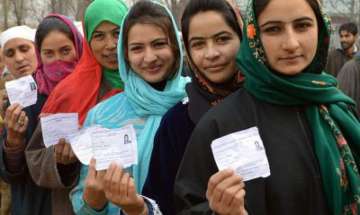The campaigning for the first phase of the urban local body (ULB) elections in Jammu and Kashmir ended on Sunday. The voting in 42 wards spread over a dozen of districts will begin on Monday.
The polling which will start from 7 am on Monday will determine the fate of 1,283 candidates -- the highest in any phase -- who are trying their luck from 247 wards in Jammu, 149 in Kashmir and 26 in Ladakh.
While the candidates have left no stone unturned to woo the voters in the Jammu and Ladakh regions, the campaigning has been a low-key affair in the Valley, where threats, violence and boycott by the state's two main parties -- the National Conference (NC) and the People's Democratic Party (PDP) -- have cast a shadow over the polls.
The first phase of polling will be followed by the second phase covering 384 wards on October 10, third phase covering 207 wards on October 13 and the last phase covering 132 wards on October 16. The counting of votes will be done on October 20.
The last election to the municipal bodies in the state was held in 2005 through secret ballots and the five-year term expired in February, 2010.
As many as 2,990 candidates are in the fray for the four-phased elections covering a total of 1,145 wards, including the municipal corporations for the twin capitals of Jammu and Srinagar.
As many as 2,137 candidates are in fray from Jammu, 787 from Kashmir and 66 from Ladakh.
As many as 244 candidates -- 231 in Kashmir and 13 in Jammu -- have been declared elected unopposed.
The NC and the PDP have boycotted the polls over the challenge to the validity of Article 35-A of the Constitution and got support from the Communist Party of India (Marxist) and the Bahujan Samaj Party (BSP), who too have decided to stay away from the election, leaving the Bharatiya Janata Party (BJP) and the Congress in a direct contest with each other.
However, the two parties cannot ignore the resurgent National Panthers Party (NPP) especially in the Jammu region, and the Independent candidates.
There are 16,97,291 eligible voters in the municipal polls. Kashmir Valley has the highest number of 598 wards and an electorate of 10,32,498, while Jammu has 521 wards with 6,44,568 voters. The Ladakh region has 26 wards with a 20,225-strong electorate.
"The campaigning ended peacefully for the first phase across the state. No untoward incident was reported from anywhere," a poll official said.
While the State Election Commission officials refused to divulge the number of polling stations set up for the first phase, the authorities in Jammu said 671 polling stations were set up in the three districts of Jammu, Rajouri and Poonch, which would be covered under the first phase.
As many as 584 polling stations will be set up in Jammu, 61 in Rajouri and 26 in Poonch district, officials said.
A 4,42,159-strong electorate will vote to elect their representatives among 743 candidates at 584 polling stations, including 505 polling stations for the Municipal Corporation of Jammu and 79 for the municipal committees, District Election Officer Ramesh Kumar said.
While 447 candidates are in the fray for the 75 wards of the Municipal Corporation of Jammu, 296 candidates are trying their luck in the 79 wards of seven municipal committees.
Foolproof security arrangements have been made for the smooth conduct of the polls. For the first time, electronic voting machines (EVMs) will be used in the urban local body polls in the state, officials said.
The state government has declared a holiday in the poll-bound areas on Monday.
